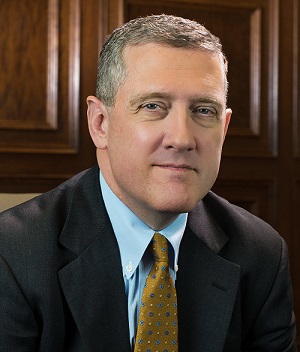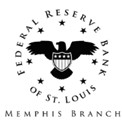2018 Economic Outlook Briefing
James Bullard, President
Federal Reserve Bank of St. Louis
Thursday, October 18, 2018
Breakfast, 7:30 am
Holiday Inn - University of Memphis
3700 Central Avenue, Memphis, TN 38111
Open to the Public
Registration Deadline - Monday, October 15, 2018
The Economic Club of Memphis in partnership with the Federal Reserve Bank of St. Louis – Memphis Branch is pleased to present the 2019 Regional Economic Briefing and breakfast on Thursday, October 18, 2018. The speaker will be James Bullard, President of the Federal Reserve Bank of St. Louis.
A breakfast buffet will begin at 7:30 am. This meeting is open to the public at no charge. Reservations are required. Please share the details with friends and colleagues who may be interested in attending.
James “Jim” Bullard is the president and CEO of the Federal Reserve Bank of St. Louis. He oversees the activities of the Eighth Federal Reserve District, including operations in the St. Louis headquarters and its branches in Little Rock, Ark., Louisville, Ky., and Memphis, Tenn. He also participates on the Federal Reserve’s Federal Open Market Committee, or FOMC, which meets eight times each year to set the direction of U.S. monetary policy.
Bullard is a noted economist and scholar, and his positions are founded on research-based thinking and an intellectual openness to new theories and explanations. He is often an early voice for change. Of note:
In 2016, Bullard announced a new approach for the St. Louis Fed’s near-term U.S. macroeconomic and monetary policy projections. The new approach is based on the idea that the economy may experience one of several possible persistent regimes, which involve a combination of recession or no recession, high or low productivity growth, and high or low real returns on government debt. While switches between regimes are possible, they are difficult to forecast. This contrasts with the more traditional approach to monetary policy projections, which assumes that the economy will converge to one single, long-run steady state.
Earlier in his tenure, Bullard warned about the possibility of a Japanese-style deflation in the U.S. His paper on this topic, published in 2010, helped move the FOMC’s thinking toward a second round of quantitative easing.
He has argued strongly that the timing of monetary policy decisions, including interest rate policy or the pace of asset purchases, should be driven by incoming data on the state of the economy as opposed to the calendar.
During the financial crisis, Bullard also advocated for establishing an explicit inflation target, which the FOMC has since adopted. And he has argued that the Committee should defend the target when inflation is below as well as above it.
In 2008, Bullard was an early voice on the potential consequences of zero-interest-rate policy. He argued that the Fed may need to turn to quantitative measures of monetary policy in order to avoid deflation.
Bullard makes public outreach and dialogue a priority to help build a more transparent and accessible Fed. He regularly engages with many audiences—including academics, policymakers, business and labor organizations, charities, students and media, among other public groups—to discuss monetary policy and the U.S. economy and to help further the regional Reserve banks’ role of being the voice of Main Street.
Bullard is active in the community. He is an honorary professor of economics at Washington University in St. Louis, where he also sits on the advisory council of the economics department, as well as several advisory boards. In addition, he is a member of the Greater St. Louis Financial Forum, the St. Louis Regional Chamber’s board of directors and the St. Cloud State University School of Public Affairs advisory council. He is also chairman of the United Way’s U.S.A. Board of Trustees and a member of the United Way Worldwide board. In addition, he is a member of the Central Bank Research Association’s senior council.
A native of Forest Lake, Minn., Bullard received his doctorate in economics from Indiana University in Bloomington. He holds Bachelor of Science degrees in economics and in quantitative methods and information systems from St. Cloud State University in St. Cloud, Minn.



